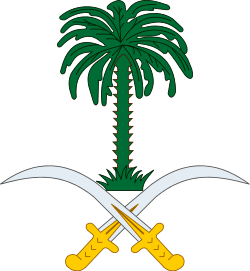Indonesia–Saudi Arabia relations
 |
|
Indonesia |
Saudi Arabia |
|---|---|
Indonesia–Saudi Arabia relations are particularly notable because Saudi Arabia is the birthplace of Islam, and Indonesia is home to the world's largest Muslim population in the world; both are Muslim majority countries.[1] Economy and trade relations are also particularly important, especially on oil (energy) and human resources (migrant worker) sectors. Saudi Arabia has an embassy in Jakarta, while Indonesia has an embassy in Riyadh and a consulate in Jeddah. Both countries are members of the Organisation of Islamic Cooperation and G-20 major economies.
History
The historical link between Indonesia and Saudi Arabia was Islam. Numerous Muslim traders and ulamas arrived in the Indonesian archipelago from the Arab World during the coming of Islam around the 13th century. Since the early 20th century, Indonesian Muslims have taken the hajj pilgrimage to Mecca. As the country with the largest Muslim population, Indonesia sends the largest number of hajj pilgrims among Muslim countries.[2][3][4] Official diplomatic relations between Indonesia and Saudi Arabia were opened in 1950.
The two countries signed a defense cooperation agreement in late January 2014. The agreement largely covers force training and counter-terrorism.[5]
Trade
In 2008, bilateral trade reached nearly US$6 billion. Because of its oil and gas exports, the trade balance is heavily in favor to Saudi Arabia, while Indonesia mainly exports plywood, textiles, apparel, palm oil, paper and tires.[1]
Migrant workers and human rights abuses
Saudi Arabia is a major employer for thousands of Indonesian workers, mostly in the domestic sector as house maids. As of 2009, there are around 1 million Indonesian workers working in Saudi Arabia.[1] However, there are reports of abuses of Indonesian migrant workers by their Saudi Arabian employers. There are reports of physical abuses, and some led to the death of Indonesian maids.[6] Most of the time, justice was not enforced in Saudi Arabia as the abusers have rarely faced punishment greater than a fine. Some of these cases have attracted worldwide attention.[7]
Another problem is the number of Indonesian workers facing death row in Saudi Arabia. These Indonesian maids have been arrested on alleged charges of murder, witchcraft and sexual offenses. In June 2012, around 32 Indonesian housemaids were arrested and held under death sentences. A few maids were sentenced to death earlier.[8]
See also
Notes
- 1 2 3 Veeramalla Anjaiah (September 30, 2009). "Saudi Arabia eyes special relationship with RI: Envoy". The Jakarta Post. Retrieved 4 February 2013.
- ↑ The Government of Saudi Arabia establishes hajj quota, every Muslim country has a hajj quota of 1,000 pilgrims per million inhabitants, making Indonesian hajj quota around 200,000 pilgrims.
- ↑ "Saudi rejected raising hajj quotas: report". Hurriyet Daily News. September 19, 2012. Retrieved 4 February 2013.
- ↑ "No Hajj Quota Increase This Year From Saudi Government". Jakarta Globe. September 10, 2012. Retrieved 4 February 2013.
- ↑ Ankit Panda (25 January 2014). "Indonesia and Saudi Arabia Sign Defense Cooperation Agreement". The Diplomat. Retrieved 16 February 2014.
- ↑ Kathy Quiano and Moni Basu (November 19, 2010). "Indonesian maid dies after abuse in Saudi Arabia, rights group says". CNN.com. Retrieved 4 February 2013.
- ↑ "Indonesia condemns Saudi maid abuse acquittal". BBC News. 4 April 2011. Retrieved 4 February 2013.
- ↑ Ghazanfar Ali Khan (25 June 2012). "Indonesian mission working toward solving 32 maids cases". Arab News. Retrieved 4 February 2013.
External links
- Embassy of the Republic of Indonesia in Riyadh, Saudi Arabia
- The Embassy of Saudi Arabia in Indonesia

